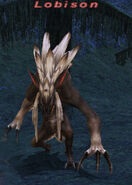(removed comment regarding when Lobisons stand--People have seem them stand up during the night, I've seen them stand up during the day.) |
No edit summary |
||
| Line 60: | Line 60: | ||
'''Notes:''' |
'''Notes:''' |
||
| − | :*Can change to standing mode, does not appear to be linked to moon phase. Standing Lobisons seem to have higher attack, lower accuracy, higher defense, and guard more and apparently resist to sleep. |
+ | :*Can change to standing mode, does not appear to be linked to moon phase. Standing Lobisons seem to have higher attack, lower accuracy, higher defense, and guard more and apparently resist to sleep. [[Repose]] is effective. |
== Historical Background == |
== Historical Background == |
||
Revision as of 22:25, 22 March 2008
|
Zone |
Level |
Drops |
Steal |
Spawns |
Notes |
|
~82 |
(F-6) |
A, S, H, L | |||
|
A, S, H, L | |||||
|
HP = Detects Low HP; M = Detects Magic; Sc = Follows by Scent; T(S) = True-sight; T(H) = True-hearing JA = Detects job abilities; WS = Detects weaponskills; Z(D) = Asleep in Daytime; Z(N) = Asleep at Nighttime; A(R) = Aggressive to Reive participants | |||||
Notes:
- Can change to standing mode, does not appear to be linked to moon phase. Standing Lobisons seem to have higher attack, lower accuracy, higher defense, and guard more and apparently resist to sleep. Repose is effective.
Historical Background
In Argentinian mythology, the Lobisón (or Luisón) was a werewolf-like creature, a black or gray wolf the size of a small horse. According to legend, the 7th consecutive son in a family will become a lobison. They hunt at night under a full moon, preferring to prey on cattle rather than people. The 7th consecutive daughter born to a family will become a witch. This superstition was held into the 20th century, resulting in the seventh-born children being abandoned. The Argentine government passed a law forbidding this practice in the 1920s.


